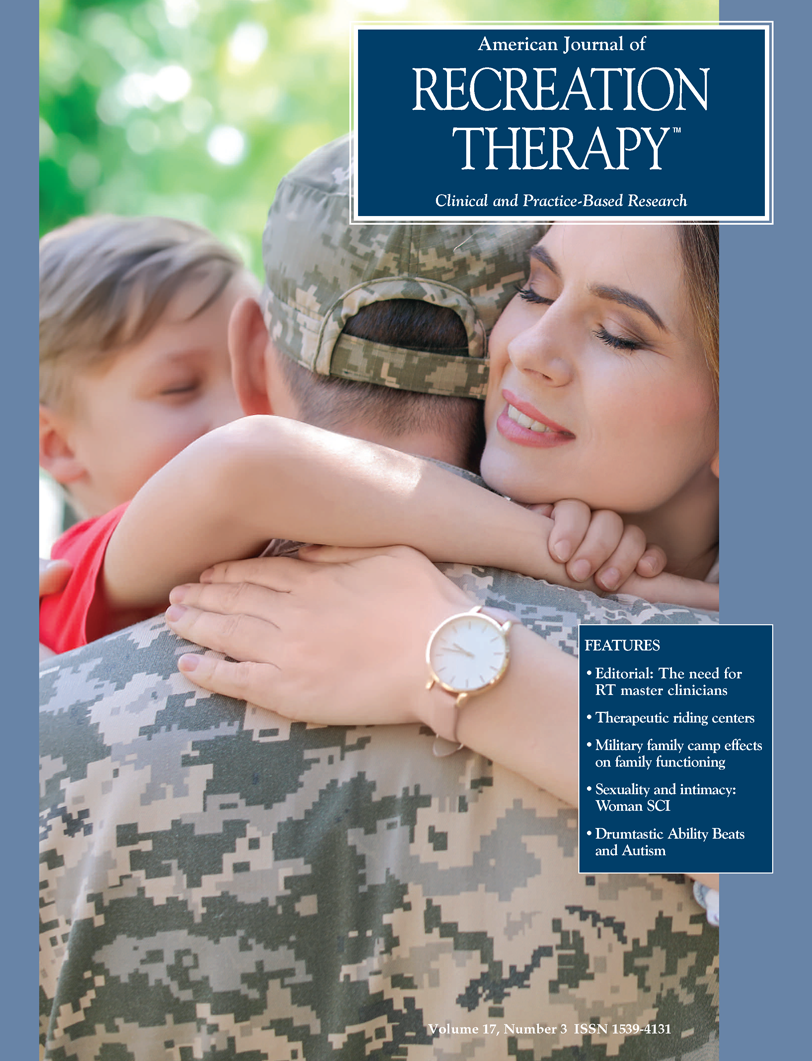Therapeutic riding centers: Unexpected benefits
DOI:
https://doi.org/10.5055/ajrt.2018.0163Keywords:
therapeutic horseback riding, equine-assisted activities and therapies, recreational therapy, PATH internationalAbstract
The benefits of therapeutic horseback riding for clients has been shown to improve physical, emotional, and communication skills.1 However, there is no research examining the benefits of owning or operating a therapeutic horseback riding center. The purpose of this study is to understand the benefits of owning/working at a Professional Association of Therapeutic Horsemanship (PATH) International Certified Riding Center. A multisite case study using semistructured interviews was used to complete this study. Fifteen 1-hour interviews were collected from individuals who own or work at a PATH center. Three themes emerged: Rewards, Cultivating Community, and Elements for Success. The outcomes of this study may provide centers who have not sought PATH certification incentive to seek that level of accreditation.
References
Naomi S: Practical Guide Series, No. 4: Special Needs, Special Horses: A Guide to the Benefits of Therapeutic Riding. College Station, TX: University of North Texas Press, 2005. Available at https://untpress.unt.edu/catalog/3174. Accessed August 7, 2018.
Pavlides, M: Therapeutic Riding. Animal-Assisted Interventions for Individuals with Autism. London: Jessica Kingsley Publishers, 2008: 131-159.
PATH International: About PATH International. Denver, CO: Path International, 2018. Available at https://www.pathintl.org/about-path-intl/about-path-intl. Accessed August 7, 2018.
Kwon J, Chang HJ, Yi S, et al.: Effect of hippotherapy on gross motor function in children with cerebral palsy: A randomized controlled trial. J Altern Complement Med. 2015; 21(1): 15-21. doi:10.1089/acm.2014.0021.
Baik K, Byeun JK, Baek JK: The effects of horseback riding participation on the muscle tone and range of motion for children with spastic cerebral palsy. J Exerc Rehabil. 2014; 10(5): 265-270. doi:10.12965/jer.140124.
Moraes AG, Copetti F, Angelo VR, et al.: The effects of hippotherapy on postural balance and functional ability in children with cerebral palsy. J Phys Ther Sci. 2016; 28(8): 2220-2226. doi:10.1589/jpts.28.2220.
Lanning BA, Krenek N: Examining effects of equine-assisted activities to help combat veterans improve quality of life. J Rehabil Res Dev. 2013; 50(8): 7-13. doi:10.1682/JRRD.2013.07.0159.
Earles JL, Vernon LL, Yetz JP: Equine-assisted therapy for anxiety and posttraumatic stress symptoms. J Trauma Stress. 2015; 28(2): 149-152. doi:10.1002/jts.21990.
Pendry P, Carr AM, Smith AN, et al.: Improving adolescent social competence and behavior: A randomized trial of an 11-week equine facilitated learning prevention program. J Prim Prev. 2014; 35(4): 281-293. doi:10.1007/s10935-014-0350-7.
Gabriels RL, Pan Z, Dechant B, et al.: Randomized controlled trial of therapeutic horseback riding in children and adolescents with autism spectrum disorder. J Am Acad Child Adolesc Psychiatry. 2015; 54(7): 541-549. doi:10.1016/j.jaac.2015.04.00.
Holm BM, Baird JM, Kim JY, et al.: Therapeutic horseback riding outcomes of parent-identified goals for children with autism spectrum disorder: An ABA multiple case design examining dosages and generalization of the home and community. J Autism Dev Disord. 2013; 44: 937-947. doi:10.1007/s10803-013-1949-x.
Creswell JW: Educational Research: Planning, Conducting, and Evaluating Quantitative and Qualitative Research. 2nd ed. Upper Saddle River, NY: Pearson, 2005.
Published
How to Cite
Issue
Section
License
Copyright 2000-2023, Weston Medical Publishing, LLC
All Rights Reserved


